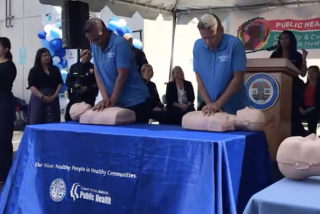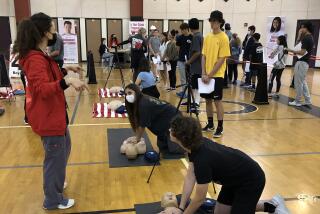CPR as the first response
When someone goes into cardiac arrest outside a hospital -- a fatal event more than 95% of the time -- paramedics almost always use a defibrillator to shock the heart back into normal rhythm. But that approach might not always be the best.
If ambulance help arrives more than five minutes after the heart has stopped, emergency personnel first should attempt cardiopulmonary resuscitation, new research suggests. It primes the pump, so to speak, and improves survival.
Most cases of cardiac arrest result from ventricular fibrillation, an erratic rhythm in which the heart’s main pumping chamber quivers, but can’t pump blood. Almost no one survives if the heart continues to fibrillate more than 10 minutes.
Now, a study of 200 non-hospitalized patients who suffered ventricular fibrillation has shown that having ambulance crews perform CPR before using a defibrillator improved the chances of restoring normal heart rhythm.
Among the 96 patients who got just defibrillation, 15% survived at least through the resulting hospital stay. Among the 104 who got CPR before defibrillation, 22% survived. The more dramatic finding was that in the subgroup of patients facing ambulance waits of more than five minutes, undergoing CPR first, whether provided by emergency crews or a bystander, improved their odds not only of surviving the hospital stay, but also of living another year.
The study was published in the current issue of the Journal of the American Medical Assn.
Because other studies have shown that immediate defibrillation is highly effective, the authors said there is likely a cut-off period during which defibrillation first is best. They put that time at four to five minutes, but said more study is needed.
Dr. Terence D. Valenzuela, a professor at the University of Arizona in Tucson, and author of an accompanying editorial in the journal, endorsed CPR before defibrillation as a general rule for out-of-hospital cardiac arrests because nearly all of them involve long waits.






